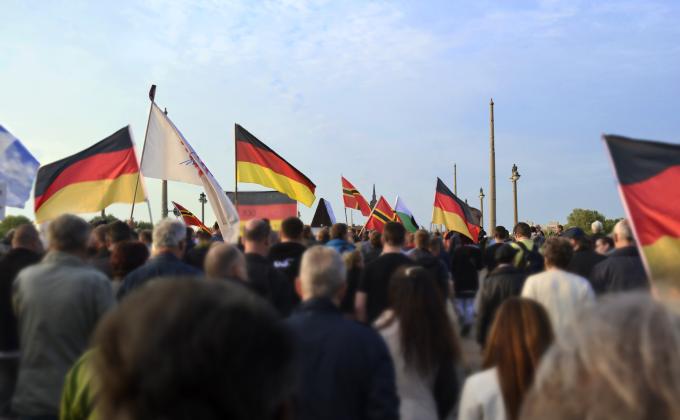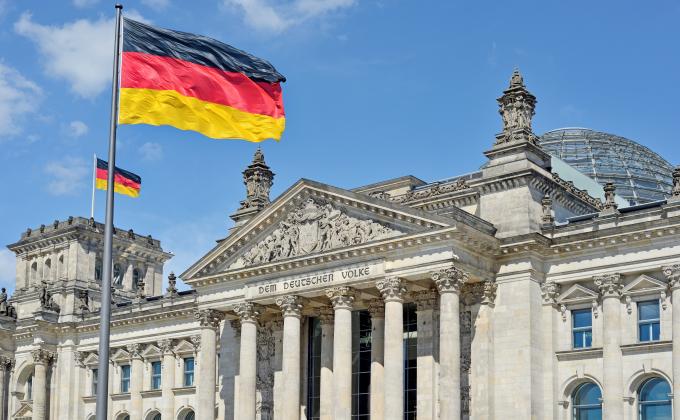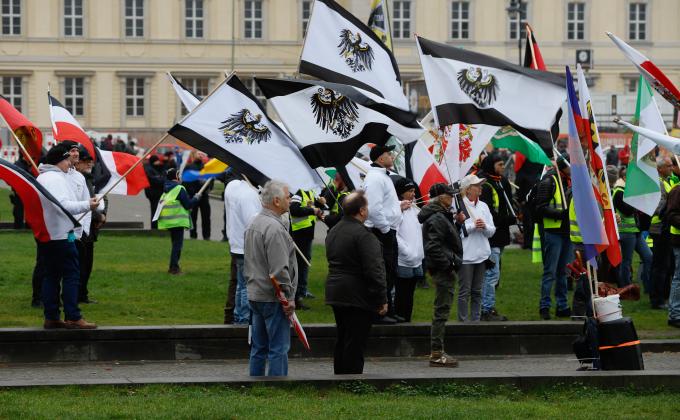Shortly after achieving its best-ever result in Germany’s recent federal election and coming in second overall, the Alternative für Deutschland (Alternative for Germany; AfD) was officially classified by Germany’s domestic intelligence agency, the Bundesamt für Verfassungsschutz (Federal Office for the Protection of the Constitution; BfV), as a “proven far-right extremist entity.” According to the BfV, the party’s ongoing xenophobic and Islamophobic agitation disparages entire population groups, disregards human dignity, and is thus anti-constitutional. While this classification should not be conflated with a formal ban, which may only be imposed by the Federal Constitutional Court, it nonetheless has far-reaching implications.
The classification marks a significant political step; never before has the biggest opposition party in Germany, which even leads in current polls, been classified as extremist. In fact, since the German reunification, the AfD is only the second party in the Bundestag, after Die Linke (The Left), which was monitored until 2013, to be placed under surveillance for extremist tendencies. While banning parties deemed extremist or terrorist is a common tool in many European countries, the German model, classifying and monitoring a party for extremism without immediately seeking a ban, is relatively unique. Nevertheless, the official determination did not come as a surprise: as early as 2019, the BfV began investigating the AfD for potentially extremist tendencies and designated it a suspected case in 2021.
The announcement drew widespread attention: politicians across the political spectrum welcomed the move, while the AfD condemned it as an assault on democracy and immediately filed a legal appeal. As a result of the lawsuit, the BfV announced that it will suspend its classification, until a verdict is reached in the urgent preliminary ruling procedure. After the upscaling of the AfD to a suspected case in 2019, a similar legal proceedings later confirmed the classification made by the BfV.
This analysis contextualises the BfV’s classification of the AfD as a far-right extremist party. First, it traces the AfD’s radicalisation trajectory, from its early Euroscepticism to its current extremist posture. The following analysis is structured around three themes central to the party’s ideological profile and crucial to its classification, according to the since-leaked report: xenophobia and Islamophobia; gender- and sexuality-based animosity; and antisemitism. Finally, the paper discusses the legal, political, and societal implications of the classification.
From radical to extreme right
To trace the AfD’s radicalisation, the concept of far-right extremism must first be defined. In general, far-right ideology combines authoritarianism and nativism, rooted in the idea of a fusion between the state and the people as a singular, homogenous entity. Within this framework, a distinction can be made between the radical and the extreme right. The former rejects several liberal components of democracy, such as minority rights, but seeks to realise its objectives through democratic means, by replacing the liberal elites. In contrast, the extreme right fundamentally rejects democracy altogether and often views violence as legitimate to pursue its political goals. While the AfD has firmly belonged in the radical right camp from the outset, a number of recent developments have raised suspicion that the AfD might have become an extremist party.
Throughout the years, the AfD has undergone a significant shift to the far-right. The AfD was founded in 2013 as a Eurosceptic party, in the context of the eurozone crisis and the related German financial aid for countries such as Greece, which has met with strong opposition in the German population. During the so-called refugee crisis of 2015-2016, which saw a significant influx of refugees from countries such as Syria, Afghanistan, and Iraq, the AfD adopted increasingly xenophobic and Islamophobic rhetoric, which has since become central to its political identity. Likewise, during that time, anti-establishment elements gained prominence within the party. For example, the AfD started labelling politicians from other parties as “Volksverräter” (traitors of the people) and accused the mainstream media of systematically deceiving the public in favour of the ruling government, dubbing them “Lügenpresse” (lying press); terms popularised by the Nazis.
Repeated statements by party officials suggest that the AfD has not only radicalised further but is increasingly adopting a revolutionary approach. In a leaked chat group of the AfD’s Bavarian branch, one state MP called for “upheaval and revolution,” while another agreed that a “civil war” might be the only remaining option. Even more, senior party figures such as Björn Höcke, one of the party’s chief ideologists, have repeatedly, at least implicitly, called for violence against political opponents by calling upon their supporters to “set an example” and to “resist.” While such statements do not necessarily constitute direct, open calls for violence, research has demonstrated that drawing on imperilment narratives, combined with the notion that the government is unable or unwilling to protect its people, can also evoke radicalising dynamics. Individuals may come to perceive violence as legitimate, and even necessary as an act of self-defence.
Over the years, the AfD has also developed firm ties to the broader far-right milieu. Investigations have shown that AfD members of parliament employ over 100 individuals with ties to far right organisations, including the Identitarian Movement, neo-Nazi groups, sovereign citizen networks, and conspiracy movements. AfD politicians have met with neo-Nazis, including members from Blood & Honour, and conspiracists and participated in corresponding demonstrations, such as protests organised by the conspiracist Querdenken movement during the COVID-19 pandemic. Likely aiming to establish a “mosaic right,” the party maintains particularly close links with key actors of the German Nouvelle Droite, all of which are monitored by the BfV for far-right extremist tendencies.
Ideological profile of the AfD
According to the BfV, the AfD employs an “ethnicity- and ancestry-based” understanding of Germanness. Although the AfD avoids explicit references thereto, this essentially reflects an Identitarian worldview based on ethnopluralism as its core concept. In line with this ideology, the AfD ties citizenship to ethnic descent rather than constitutional principles and differentiates between so-called “Bio-Germans” and “passport-Germans.” In 2023, journalists exposed a secret meeting attended by far-right actors, including several AfD members and Martin Sellner, head of the Identitarian Movement Austria, where a so-called “remigration masterplan” was discussed. In its essence, the far-right “remigration” concept refers to the mass deportation of people with a migration background, both voluntarily and forcefully, regardless of whether they hold German citizenship. While initially distancing itself from it, following a massive public outcry, the AfD officially endorsed remigration in its programme for the 2025 federal election. In general, immigrants, especially those of Muslim origin, are portrayed as a threat to the native German population. This is done, for instance, by invoking the narrative of “knife migrants,” linking them to rape through manufactured or exaggerated crime statistics, or by conflating Islam with terrorism through terms like “Islam terrorism.” Even more, the party decries an ongoing “Africanisation, Orientalisation and Islamisation” with Islam as “occupying power,” insinuating that Muslim immigrants are aspiring to take over Germany. This likewise manifests in the endorsement of the conspiracy theory The Great Replacement by multiple party members, which claims that a secret plot exists to replace white Europeans with non-white, particularly Muslim, immigrants.
The AfD also positions itself in stark opposition to what it labels “woke ideology,” resulting in pronounced anti-feminist and anti-LGBTQI+ stances. The party opposes the liberalisation of abortion rights and gender equality policies, instead promoting a binary understanding of gender and traditional family roles, with women cast primarily as mothers and men as providers. The AfD’s rhetoric often includes claims that feminist and progressive politics deprive men of their professional and sexual entitlements, and that men must defend “their” women against a perceived migrant threat. The AfD rejects same-sex marriage, adoption rights for queer couples, and legal recognition for trans individuals. Party officials often portray sex education in high schools, which includes discussions on LGBTQ+, as “indoctrination,” and some have equated queer identities with paedophilia.
Despite its self-proclaimed alignment with the Israeli state, the AfD’s agitation frequently features both structural and secondary antisemitism. Whereas the former refers to the rejection of guilt for Nazi crimes and a dismissal of the culture of remembrance, the latter involves instances in which Jews are scapegoated or stereotyped without being explicitly mentioned. Prominent figures have described the Berlin Holocaust Memorial as a “monument of shame,” while its lead candidate for the most recent European elections, Maximilian Krah, stated that “not every SS officer was a criminal.” Moreover, AfD politicians often endorse conspiracy theories like the Great Replacement, Eurabia or QAnon, all of which rely on the notion of a nebulous, malicious elite, which implicitly stands for Jews. Party members also frequently invoke antisemitic tropes and chiffres, referring to figures such as George Soros, the Rothschild family, or “globalists.”
In recent years, AfD members have also increasingly been linked to extreme right terrorism. For instance, former MP Birgit Malsack-Winkemann was a central figure in the Patriotische Union (Patriotic Union), a group that planned a violent coup. At least three members of the recently arrested terrorist cell Sächsische Separatisten (Saxonian Separatists), which plotted ethnic cleansing in the state of Saxony, were members of the AfD’s youth wing and active in local party politics. This violent dimension even features a trans-national character, as for instance expressed by the case of Manuel Ochsenreiter, who, while working as a consultant for an AfD MP, allegedly orchestrated the firebombing of a Hungarian cultural centre in Ukraine by Polish far-right militants.
Implications and New Countermeasures
The official determination underscores the seriousness of the threat that the BfV now considers the AfD to pose and entails wide-ranging legal and political ramifications. First, the upscaling from a suspected case to a proven extremist case unlocks a number of new reconnaissance and surveillance measures. Whereas previously, Germany’s domestic intelligence agency was only allowed to collect and analyse public statements, it is now authorised to recruit clandestine informants, place individuals under surveillance, and intercept telecommunications.
Second, the official determination also provides a number of legal measures that could be employed. In Germany, parties that achieved at least 0.5 percent of the valid list votes cast in the last European or Bundestag elections, or at least 1 percent in one of the last state elections, are entitled to state funding. However, in 2017, the corresponding paragraph in the constitution regulating party funding was amended to the effect that proven extremist parties can be excluded from such funding. Provided that the AfD’s classification is confirmed in court, the federal parliament, the federal council, or the federal government could file a corresponding motion with the supreme court, which would have to rule on the exclusion. Considering that approximately a third of the AfD’s funding comes from state support, this could significantly impact the party’s operational capabilities. Furthermore, the official determination could also affect the employment relationships of AfD members who are civil servants. In Germany, civil servants are required to take an oath to uphold the liberal democratic basic order, which constitutes the core of the German constitution. As a result, they have a “special fiduciary duty” to the constitutional order, which seems incompatible with membership in an extremist party. Although this would require a case-by-case decision, some German state interior ministers have already suggested reviewing the possibility of dismissal on these grounds, especially with regard to police officers and soldiers.
Furthermore, the designation may also have a broader socio-political signalling effect. As a result of its recent electoral success, a debate has once again arisen about whether the AfD should be incorporated into the political process like any other party or not. So far, at the federal level, all other parties have invoked the premise of a “Brandmauer” (firewall), rejecting any cooperation with the AfD. For instance, although the AfD is technically entitled to some parliamentary positions in the Bundestag, such as the vice president of parliament or committee chairs, the other parties have refused to vote in AfD candidates on the grounds of the party’s right-wing extremist nature. While Germany’s supreme court ruled that there is no legal obligation for Members of Parliament to vote for specific AfD candidates, after the election, some politicians have questioned this practice. The strongly delegitimising effect of the designation may curb such efforts, as any cooperation with extremist entities is widely considered taboo. Likewise, this could affect engagement with the party in the pre-political context, such as missed invitations to appear on talk shows.
Finally, the decision highlights the trade-off between the protection of democracy on the one hand, and infringement on political freedom on the other hand. Throughout the years, the AfD’s success has also drawn on Euroscepticism and anti-establishmentarianism, which are more populist than extremist. A survey shows that, especially throughout the last legislative period, the AfD was able to attract a significant number of dissatisfied voters from different parties, many of whom do not hold thoroughly far-right extremist beliefs. At the same time, post-election polls highlighted that xenophobia and Islamophobia have increasingly become more decisive for the AfD’s success. Likewise, polls show that the AfD is increasingly being voted for out of conviction rather than out of protest, and the proportion of voters with a far-right extremist worldview is growing.
Quo Vadis, AfD?
The classification of the AfD as a proven right-wing extremist organisation marks a significant turning point in Germany’s democratic history. Never before has the largest opposition party been classified as extremist. It also revives the longstanding debate over whether the state, and its security services, should address both violent and non-violent forms of extremism, or whether its focus should remain solely on violent expressions thereof. Proponents of the latter view, such as the current United States administration, reject monitoring non-violent extremist activism, arguing that it constitutes an impermissible infringement on fundamental democratic rights, particularly the freedoms of expression, assembly, and association. By contrast, European countries such as Germany maintain that extremism, whether violent or not, is by nature directed against core constitutional principles and therefore falls outside the scope of protected democratic activities. Given Germany’s historical experience, the prevailing argument is that non-violent forms already have a severe impact on targeted groups, for instance through hate speech, and may ultimately escalate into violence with catastrophic consequences.
From this perspective, the AfD’s classification was made on reasonable grounds. As outlined above, there are few doubts about the party’s extremist nature. However, since the classification does not constitute a ban, the question of how best to engage with the AfD remains unresolved. On the one hand, incorporating the party into day-to-day politics may disenchant its appeal by revealing its inability to offer effective solutions. Furthermore, continued ostracisation of the AfD may contribute to the radicalisation of a significant part of society. On the other hand, recent years have shown that involving extremists in political discourse tends to legitimise and mainstream their positions, effectively increasing rather than undermining their approval. Regardless of this dilemma, it seems all the more important to address the demand-side factors behind support for far-right parties, rather than focusing only on their organisational manifestations.
This article represents the views of the author(s) solely. ICCT is an independent foundation, and takes no institutional positions on matters of policy unless clearly stated otherwise.
Photocredit: nitpicker/Shutterstock








